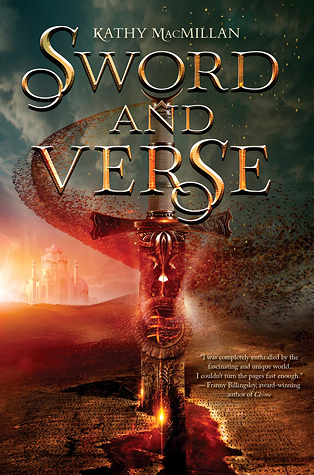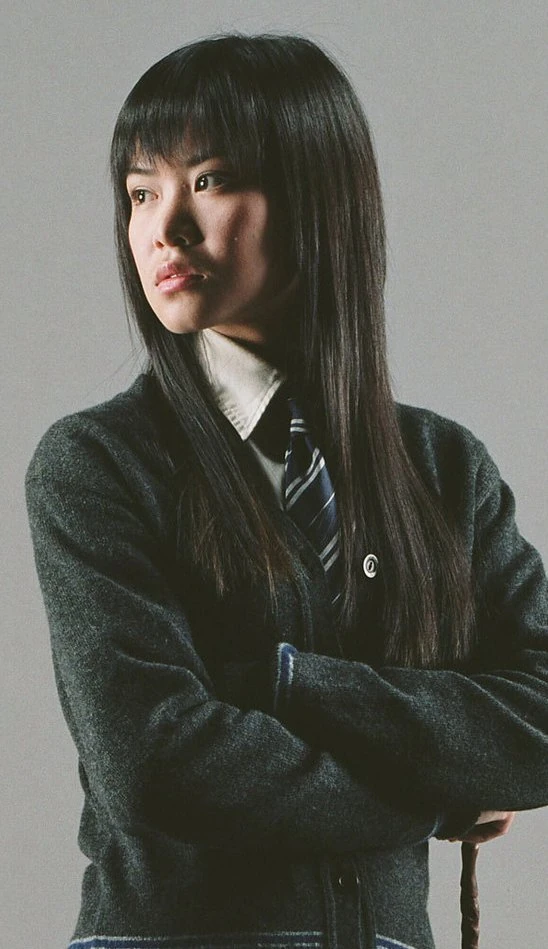AUTHOR: Kathy MacMillan
PUBLISHER: HarperTeen
AVAILABILITY: Preorder on Amazon
GENRE
Young Adult - Fantasy
REVIEW
Kathy MacMillan's debut fantasy novel, Sword and Verse, takes place in a far-off fantasy realm called Qilara, which is reminiscent of ancient Egypt. The book was partly inspired by the Library of Alexandria, and there is indeed a grand library full of scrolls and statues of gods that I just wanted to wander around wide-eyed in. Before I even dive into the plot summary part of this review, let me start by saying that the world-building in this book is AWESOME. The book has richly imagined cultures and a detailed society that just comes to life and feels real. In fact, it reads a bit more like historical fiction than your usual fantasy, in that there's no magic. Well, there may be some supernatural elements in that people believe in gods and all, but much like in our world, people only see the effects of the gods' actions and don't witness the gods themselves. And yet the gods' presence is felt in the tale. Each chapter opens with a paragraph or so from the world's mythology, telling the tale of how the gods and the world came to be.
In this world, only four people are allowed to learn the highest form of language. These are the King, the Prince, the Tutor (who teaches the Prince), and the Tutor-in-Training (who will someday teach the Prince's son, after he becomes King). Accessing this restricted knowledge (that is, learning to read) is punishable by death. Raisa's parents belonged to a society that didn't believe in restricting knowledge, and they were killed for their knowledge with the Qilarites invaded. Raisa learned some reading, but survived by pretending to be illiterate (and someone else's child) and was forced into slavery. A chance encounter with Prince Mati leads to her promotion from ordinary slave to Tutor-in-Training, and in this new role, she ends up spending a lot of time with him. Unlike the King, Mati is sensitive and thoughtful--and derided by his own father for being "soft" and unfit to rule. But these are the very qualities Raisa admires about him... and ends up falling in love with him for.
Further complicating her life is the fact that her predecessor was executed for illegally teaching Resistance members, who seek to end slavery, to read. Because of this, Raisa is treated with suspicion. And then the Resistance comes knocking on her door, expecting her to take her predecessor's place.
I liked that Raisa didn't immediately heed the call to arms, and that the dynamics between the System and the Resistance are more complicated than what's usually seen in rebellion stories. Usually, the System is unquestionably bad, and the plucky Resistance is undeniably good (like the Galactic Empire versus the Rebel Alliance in Star Wars). Here, things get more complex. The Resistance is fighting for a good cause, but their methods are questionable (they resort to lying, kidnapping, and even murder, and try to manipulate Raisa into following them). They'd probably kill Mati if given the chance. Meanwhile, Mati, who's heir to the System, has vowed to end slavery and raids like the one that killed Raisa's parents when he becomes King. So Raisa finds herself well and truly stuck between a rock and a hard place. There are no easy answers and certainly no way out. As a reader, I didn't know who to root for... the Resistance, for fighting the good fight? Or Mati, for seeking a bloodless answer? There's also an element of political intrigue... the King's council seeks to maneuver themselves into power and use Mati as a puppet while maintaining the status quo. Which means he and the Resistance have more in common than they think.
Raisa's an easily sympathetic character. She's a scholarly girl and has no desire to be a fighter, and yet she will stand up for what she believes in. At one point in the book, she likens herself to a candle over her predecessor's wildfire. While I do love me some physically kickass girls (the Katniss Everdeens and Princess Leias of the world), it's nice to see the quiet girl as the hero for a change. She doesn't have to slice people to bits or beat them to a pulp to fight for her cause. She uses the power of her quill.
In this book, there's a reversal of the usual dynamic of light-skinned oppressors and dark-skinned oppressed people. Raisa and the other slaves mostly light-skinned (Raisa herself is pale with red hair), while the ruling class is olive-skinned with black hair (basically Egyptian), and she faces the racism of that culture because of it. It was nice seeing a fantasy world in which POC characters aren't tokens, but a vital part of the culture and the story (case in point: Mati, who has the second biggest role after Raisa--not just as a love interest, but as a critical player in the plot).
Sword and Verse is a fast-paced book that covers about three years of Raisa's life in the span of 380 or so pages. I tore through the whole thing in 3 days, and probably would have read it even faster if I hadn't had my day job to go to. I loved everything about it -- the characters (particularly Raisa, who constantly faces her fears and does things she's terrified of despite the danger to herself, and Mati, who needs to step out of that book and run for President because he'd totally make a great leader), the world-building, the pacing, the mythology... Sometimes, all you need in your life is a good fantasy like this one to curl up with.
ABOUT THE AUTHOR
Kathy MacMillan is a writer, American Sign Language interpreter, consultant, librarian and signing storyteller. She holds National Interpreter Certification from the Registry of Interpreters for the Deaf. Her diverse career includes working as a children’s librarian at public libraries, working a school librarian at the Maryland School for the Deaf, leading the Eldersburg Library Bookcart Drill Team, and performing as Scooby-Doo, Velma, and a host of other characters at a theme park. Kathy presents American Sign Language storytelling programs through her business, Stories By Hand, and also runs the storytime resource website Storytime Stuff. She is a volunteer director and board president of Deaf Camps, Inc., a nonprofit organization that provides camps for deaf children. Kathy holds a Master of Library Science from the University of Maryland, a Bachelor of English from the Catholic University of America, and a Certificate of American Sign Language Interpreting from the Community College of Baltimore County. She lives in Owings Mills, MD with her husband, son, and a cat named Pancake.
Website: https://www.kathymacmillan.com/













